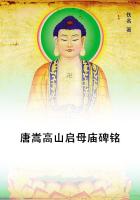Revolution is easy when the leaders are very influential.Of this Portugal and Brazil have recently furnished proofs.But new ideas penetrate the people very slowly indeed.Generally it accepts a revolution without knowing why, and when by chance it does succeed in understanding why, the revolution is over long ago.
The people will create a revolution because it is persuaded to do so, but it does not understand very much of the ideas of its leaders; it interprets them in its own fashion, and this fashion is by no means that of the true authors of the revolution.The French Revolution furnished a striking example of this fact.
The Revolution of 1789 had as its real object the substitution of the power of the nobility by that of the bourgeoisie; that is, an old elite which had become incapable was to be replaced by a new elite which did possess capacity.
There was little question of the people in this first phase of the Revolution.The sovereignty of the people was proclaimed, but it amounted only to the right of electing its representatives.
Extremely illiterate, not hoping, like the middle classes, to ascend the social scale, not in any way feeling itself the equal of the nobles, and not aspiring ever to become their equal, the people had views and interests very different to those of the upper classes of society.
The struggles of the assembly with the royal power led it to call for the intervention of the people in these struggles.It intervened more and more, and the bourgeois revolution rapidly became a popular revolution.
An idea having no force of its own, and acting only by virtue of possessing an affective and mystic substratum which supports it, the theoretical ideas of the bourgeoisie, before they could act on the people, had to be transformed into a new and very definite faith, springing from obvious practical interests.
This transformation was rapidly effected when the people heard the men envisaged by it as the Government assuring it that it was the equal of its former masters.It began to regard itself as a victim, and proceeded to pillage, burn, and massacre, imagining that in so doing it was exercising a right.
The great strength of the revolutionary principles was that they gave a free course to the instincts of primitive barbarity which had been restrained by the secular and inhibitory action of environment, tradition, and law.
All the social bonds that formerly contained the multitude were day by day dissolving, so that it conceived a notion of unlimited power, and the joy of seeing its ancient masters ferreted out and despoiled.Having become the sovereign people, were not all things permissible to it?
The motto of Liberty, Equality, Fraternity, a true manifestation of hope and faith at the beginning of the Revolution, soon merely served to cover a legal justification of the sentiments of jealousy, cupidity, and hatred of superiors, the true motives of crowds unrestrained by discipline.This is why the Revolution so soon ended in disorder, violence, and anarchy.
From the moment when the Revolution descended from the middle to the lower classes of society, it ceased to be a domination of the instinctive by the rational, and became, on the contrary, the effort of the instinctive to overpower the rational.
This legal triumph of the atavistic instincts was terrible.The whole effort of societies an effort indispensable to their continued existence--had always been to restrain, thanks to the power of tradition, customs, and codes, certain natural instincts which man has inherited from his primitive animality.It is possible to dominate them--and the more a people does overcome them the more civilised it is--but they cannot be destroyed.The influence of various exciting causes will readily result in their reappearance.
This is why the liberation of popular passions is so dangerous.
The torrent, once escaped from its bed, does not return until it has spread devastation far and wide.``Woe to him who stirs up the dregs of a nation,'' said Rivarol at the beginning of the Revolution.``There is no age of enlightenment for the populace.''
3.The supposed Part of the People during Revolution.
The laws of the psychology of crowds show us that the people never acts without leaders, and that although it plays a considerable part in revolutions by following and exaggerating the impulses received, it never directs its own movements.
In all political revolutions we discover the action of leaders.
They do not create the ideas which serve as the basis of revolutions, but they utilise them as a means of action.Ideas, leaders, armies, and crowds constitute four elements which all have their part to play in revolutions.
The crowd, roused by the leaders, acts especially by means of its mass.Its action is comparable to that of the shell which perforates an armour-plate by the momentum of a force it did not create.Rarely does the crowd understand anything of the revolutions accomplished with its assistance.It obediently follows its leaders without even trying to find out what they want.It overthrew Charles X.because of his Ordinances without having any idea of the contents of the latter, and would have been greatly embarrassed had it been asked at a later date why it overthrew Louis-Philippe.
Deceived by appearances, many authors, from Michelet to Aulard, have supposed that the people effected our great Revolution.
``The principal actor,'' said Michelet, ``is the people.''
``It is an error to say,'' writes M.Aulard, ``that the French Revolution was effected by a few distinguished people or a few heroes....I believe that in the whole history of the period included between 1789 and 1799 not a single person stands out who led or shaped events: neither Louis XVI.nor Mirabeau nor Danton nor Robespierre.Must we say that it was the French people that was the real hero of the French Revolution? Yes--provided we see the French people not as a multitude but as a number of organised groups.''















